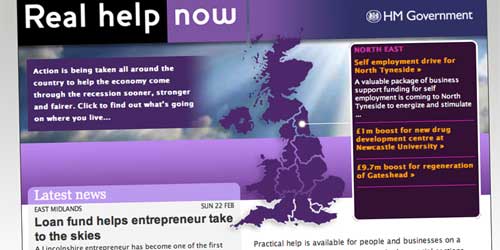
For the last couple of weeks, I’ve been working with the Downing Street team to put together Real Help Now – a fairly modest website, for now anyway, to introduce and demonstrate the practical help available to families and businesses during the recession.
Fundamentally, in this initial build, it’s a news aggregation site – pulling together material not just from national sources, but regional and local too. The aim is to complement the citizen- and business-facing stuff, at Directgov and BusinessLink respectively, by showing what’s actually happening on the ground, well away from Whitehall and the City.
What CMS are we using? Brace yourself – for once, it’s not WordPress. Not yet.
The news content is being managed through a Delicious account. When we spot a new item of interest, we tag it with the relevant region; then, when you click a region on the map, we call the relevant RSS feed in (via Google’s excellent feed API). The feeds give us everything we need; the Delicious tagging tools are excellent; and, of course, it also means Delicious users can interact directly with the account, if they so desire. The ‘latest video’ box works off RSS feeds too: we’re aggregating YouTube feeds from several government accounts, plus relevant material from Downing Street’s Number10TV (which uses Brightcove).
I could bang on about the intricacy of the HTML layering, or the gorgeous JQuery fades on the video box; but you may as well have a look for yourselves. My only disappointment comes from the animation effects I had to ditch late on, when I couldn’t make them work satisfactorily in IE6. (The majority getting a lesser service due to the minority’s refusal to make a free upgrade? – discuss.)
We aren’t making any great claims for this site: it is what it is, a pretty front end, courtesy of regular collaborator Jonathan Harris, pointing to other people’s material, plus a (first person) message from the Prime Minister. But if it can establish itself, there’s naturally plenty of scope to extend and expand into something more communicative and interactive.